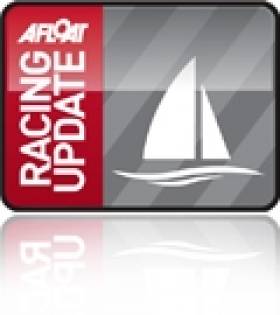Displaying items by tag: Match Racing
RSGYC take on Cumberland Cup
A Royal St George YC team will be the sole Irish representatives at the Royal Thames YC Cumberland Cup, the oldest perpetual trophy in yacht racing, with racing kicking off today at Queen Mary SC. The event is a two-boat team racing event sailed in J80s with the home team, Royal Thames, the current holders. The RSGYC team, headed up by John Sheehy and Nick Smyth, will face off against teams from Australia, Monaco, Germany, Australia, New Zealand and the USA. The Cumberland Cup dates back to 1775 and was established some 76 years before the America’s Cup
Two-boat team racing is best known in Ireland through the 'random pairs' format, where the team with a boat in last place loses the race. The result is highly tactical and combative, aggressive sailing, with the final beat to the finish line becoming particularly frantic.
Sheehy and Smyth come off a weekend that saw the pair finish in the last eight at the presitigous Wilson Team Racing Trophy in West Kirby SC, and Sheehy is also Ireland's top-ranked match racer at present.
Racing kicks off this morning, and you can catch some glimps of the action on the reservoir on their website's live webcam.
Fowler wins Investwise HYC Open
Andrew Fowler took his first win in a truncated weekend of match racing, dominating a light and tricky Sunday of racing in Howth Yacht Club for the Investwise.ie Dublin Match Race Open. With Saturday's sailing canned due to high winds and heavy seas, the event was shortened to just a single day of racing and a single round robin for the nine teams ahead of the final.
Sunday brought blue skies and never more than 13 knots, and the crews spent almost ten hours on the water in the ISA Sailfleet J80s to get one full round robin in, with each boat sailing eight races. With reigning champion John Sheehy away racing the Wilson Trophy in England, the pressure was on Andrew Fowler and his team as top-ranked Irish entry, with UK helm Mark Lees and his crew of Roddy Lacey, Toby Mumford and Matt Reid another team to watch.
Fowler and Team Lazarus (Brendan Faffiani, Guy O'Leary and Dave McHugh on main) duly delivered, sailing an immaculate round robin to finish the series without dropping a single race. The Howth MadMatch team, skippered by Ben Duncan followed in second on their home turf, dropping just two races, pushing UK visitors Team Echo into third on equal points with another home sailor, Laura Dillon.
The next event on the circuit will be the Leinster Match Racing Open, hosted by the Royal Irish Yacht Club on June 12 & 13.






























































